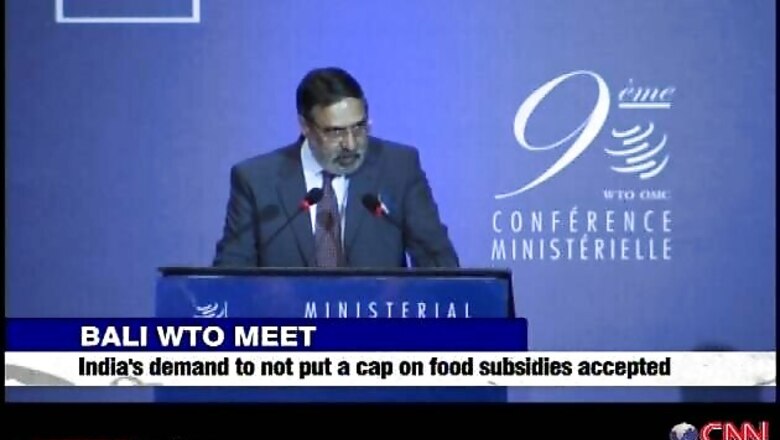
views
Bali: In a major victory for India, the WTO on Friday agreed to allow countries to provide subsidy on staple food crops without any threat of punitive action, a concession that salvaged the current round of world trade talks from the brink of collapse.
After burning the midnight oil and tough negotiations over the past four days in the face of India's unrelenting stand on the food security issue, the 159-member World Trade Organization (WTO) reached a historic agreement that will boost global trade by USD 1 trillion. The deal allows nations such as India to fix a Minimum Support Price (MSP) for farm produce and to sell staple grains to the poor at subsidised rates. It also permits countries to store foodgrains to meet contingency requirements.
"A great day for India, I am more than happy...India has clinched WTO deal for the farmers and poor of the world," Commerce and Industry Minister Anand Sharma said after the final round of negotiations.
The draft agreement, which will protect the right to food and allow India to go ahead with its USD 20 billion food security scheme, is also expected to be adopted by the plenary.
"It's a victory for Indian farmers and farmers of the developing world. It is also recognition of the right of developing nations for public stock-holding of food grains to ensure food security for their citizens," Sharma said.
The agreement will come as booster for the WTO, which until Thursday had failed to make headway with regard to the Doha round of trade talks, pending since 2001. Sources said the resolute fight put up by Sharma helped in clinching the deal in favour of the poor and subsistence farmers of the developing world.
According to the proposal, all schemes providing support in relation to procurement for public stock-holding programmes for staple food crops will be protected from WTO litigation. "All traditional staple food crops, without any numerical limit, will be covered under the decision. This decision provides legal certainty and also commits WTO members to work towards updating the rules under Agreement on Agriculture (AoA)," sources said.
The deal was clinched after WTO Director General Roberto Azevedo on Thursday night called a crucial meeting of key players, which continued till early Friday morning. It was attended by Sharma, US Trade Representative (USTR) Michael Froman and Indonesian Trade Minister Gita Wirjawan.
Developed countries such as the US and the EU wanted India to accept a peace clause, which offers four years of immunity from penalties imposed for breaching the farm subsidy cap of 10 per cent under the AoA. Host Indonesia shared the same view.
India and other developing nations, on the other hand, wanted the peace clause until a permanent solution is found on the matter for smooth implementation of the food security programme.
Sharma said, "It's a path-breaking decision...This is the first major decision or agreement that has been reached ever since the WTO was established. The previous agreement based on the Uruguay round was inherently imbalanced and flawed. The balance was against the developing countries and that is why support was mobilised and it became an imperative to launch a new round of negotiations, which is the Doha Development Agenda."
As per the draft on the agriculture sector, members have agreed to put in place an interim mechanism until a final solution is found with regard to public stock-holding for food security purposes. Members, the draft added, "shall refrain from challenging through the WTO dispute settlement mechanism...support provided for traditional staple food crops in pursuance of public stock-holding programme for food security purposes..."
Regarded as a major development in the farm sector since 1995, sources said India's tough stance yielded results and the developed world has come around to its demand for flexibility in dealing with food security issues. Sharma had until Thursday maintained that it was "better to have no agreement than to have a bad agreement..." and got support from major emerging economies, including South Africa.
Meanwhile, an Indian official said that India would be entitled to adequate transition time as well as external support and assistance, if required, for implementing trade facilitation agreement. The trade facilitation agreement will improve competitiveness of Indian industry both in domestic trade and international trade.
"India recognises benefits of a trade facilitation agreement, which aims at simplifying customs procedures and reducing transaction costs," the official said, adding that the agreed text marks a fair balance reflecting the aspirations of both the developed and developing countries.
"It is a historic decision. It is a victory not only for India but also for developing and poor countries," Sharma said after the decision was taken on the text on the public stock holding.
Sharma talked to Prime Minister Manmohan Singh and he kept him informed on all the developments on Bali Ministerial that started on December 3, sources said. "Today he talked two times to the Prime Minister, morning and afternoon," the source said.
The WTO issue was also discussed in the special meeting of the Union Cabinet which condoled the death of Nelson Mandela, officials said. The 159-member WTO also agreed on the Trade Facilitation Agreement (TFA), which is aimed at making international trade much easier by simplifying and streamlining custom procedures across the globe. The pact is billed to bring in gains worth USD 1 trillion for global trade.
The TFA would help countries cut transaction costs. "India recognises the inherent benefits of TFA. It will improve competitiveness of Indian industry both in domestic and international trade. It will also help in the movement of commodities like grapes, groundnut and pharma consignments," an official said.
The Bali deal, which a few termed as an "early harvest", is a major breakthrough in the so-called Doha Round of talks which were launched in the Qatari capital in November 2001. "All traditional staple food crops, without any numerical limit will be covered under the decision...this decision provides legal certainty and also committees WTO members to work towards updating the rules under Agreement on Agriculture (AoA)", a source said.
"Now the four year peace clause will continue till a permanent solution is reached." As per the draft on agriculture sector, members have agreed to put in place an interim mechanism till a final solution is found with regard to public stock holding for food security purposes.
Members, the draft added, "shall refrain from challenging though the WTO dispute settlement mechanism of the agreement on agriculture in relation to support provided for traditional staple food crops in pursuance of public stock holding programme for food security purposes."



















Comments
0 comment